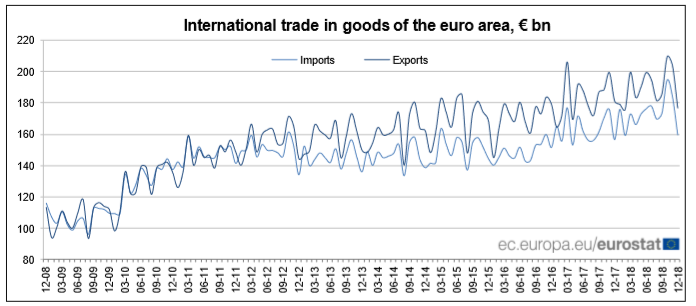Mario Alloza, Bogdan Cozmanca, Marien Ferdinandusse and Pascal Jacquinot, (2019) “Fiscal spillovers in a monetary union”, ECB Economic Bulletin, Issue 1/2019, 6 February The article describes the main transmission channels of the spillovers of national fiscal policies to other countries within a monetary union and investigates their magnitude using different models. In the context of Economic and Monetary Union (EMU), fiscal spillovers are relevant for the accurate assessment of the …Read More
What Comes After the Last Chance Commission? Policy Priorities for 2019-2024
Steven Blockmans (ed.), (2019) “What Comes After the Last Chance Commission? Policy Priorities for 2019-2024”, CEPS, 14 February Ahead of the 2019 institutional reconfiguration of the EU is a fitting moment to take stock of the European integration process and decide which priorities should define the strategic agenda of the next generation of incumbents. While acknowledging that the entire EU collective is concerned – member states and institutions alike – …Read More
Euro area international trade in goods surplus €17.0 bn
Eurostat/Euro area international trade in goods surplus €17.0 bn/15 February 2019 The first estimate for euro area (EA19) exports of goods to the rest of the world in December 2018 was €176.5 billion, a decrease of 2.5% compared with December 2017 (€181.0 bn). Imports from the rest of the world stood at €159.5 bn, a rise of 1.9% compared with December 2017 (€156.5 bn). As a result, the euro area …Read More
A Very Greek Brexit?
George Papaconstantinou, (2019) “A Very Greek Brexit?”, Project Syndicate, 14 February Unlike the United Kingdom, Greece is one of the European Union’s smaller economies, notorious for its weak institutions and economy, and a net recipient of EU funds. And yet the Grexit near-exit from the EU in 2015 offers important lessons for the final stage of Brexit negotiations. Relevant Posts Guntram B. Wolff, (2019), «The implications of no-deal Brexit: is …Read More
The euro’s global dreams and nightmares
Barry Eichegreen, (2019), “The euro’s global dreams and nightmares”, CEPS, 8 January One motive for founding the euro was to create a European unit that might provide an alternative to the dollar as an international and reserve currency. The Werner Report, the first full-throated argument for a single European currency, was issued in a period of angst about the Bretton Woods System and the dollar (Zimmermann, 2002). The Delors Report, …Read More
Labour mobility and adjustment to shocks in the euro area: The role of immigrants
Gaetano Basso, Francesco D’Amuri, Giovanni Peri, (2019), “Labour mobility and adjustment to shocks in the euro area: The role of immigrants”, 13 February, VoxEU The response of labour supply to negative shocks is different across regions due to varying levels of labour mobility. This column shows that the elasticity of labour supply in response to economic shocks is lower in the euro area than in the US, suggesting that a …Read More
A European employment guideline—a new recipe for dealing with the crisis
Beat Baumann, Joachim Ehrismann and Cris Bucheli, (2019), “A European employment guideline—a new recipe for dealing with the crisis”, 7 February, Social Europe Full employment could become a new target for an insecure Europe. A European employment guideline would provide the means to hit it. Relevant Posts Branko Milanovic, (2018), «Migration Into Europe: A Long-Term Solution?», Social Europe, 19 November Giang Ho and Rima Turk-Ariss, (2018), «The Labor Market Integration …Read More
Whose (fiscal) debt is it anyway?
Maria Demertzis, David Pichler, (2019), “Whose (fiscal) debt is it anyway?”, 6 February, Bruegel The authors map how much fiscal debt is in the hands of domestic and foreign holders in the euro area. While the market for debt was much more international prior to the crisis, this trend has since been reversed. At the same time, central banks have become important holders of fiscal debt. Relevant Posts European Commission, …Read More
Official lending in the euro area: Lessons for debt sustainability
Giancarlo Corsetti, Aitor Erce, Timothy Uy, (2019), “Official lending in the euro area: Lessons for debt sustainability “, 13 February During the euro area crisis, management of official loan maturities emerged as a critical item in the discussion on which instruments and strategies are most effective at ensuring debt sustainability. Using a theoretical model calibrated to Portugal and cross-country data, this column shows that lengthening loan maturities and managing debt …Read More
GDP up by 0.2% and employment up by 0.3% in the euro area
Eurostat/GDP up by 0.2% and employment up by 0.3% in the euro area/14 February Seasonally adjusted GDP rose by 0.2% in both the euro area (EA19) and the EU28 during the fourth quarter of 2018, compared with the previous quarter, according to a flash estimate published by Eurostat, the statistical office of the European Union. In the third quarter of 2018, GDP had grown by 0.2% in the euro area …Read More






